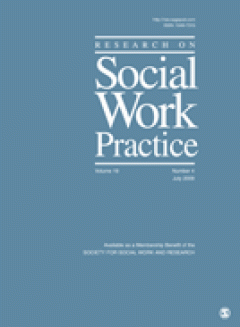Filter by

Assessing Long-Term Outcomes of an Intervention Designed for Pregnant Incarce…
Objectives: Approximately 25% of women are pregnant or postpartum when they enter prison. This study assesses a system-level intervention that prevented the separation of mothers and infants at birth, allowing them to reside together in an alternative community setting. Method: Longitudinal analysis of several state-level administrative databases compares the intervention (n = 48) group to the …
- Edition
- Vol. 20 no. 5, September 2010.pp. 528-535
- ISBN/ISSN
- 10497315
- Collation
- -
- Series Title
- Research on Social Work Practice
- Call Number
- -

Research in the Real World: Studying Chicago Police Department’s Crisis Int…
Police agencies across the country are struggling to respond to significant number of persons with serious mental illness, who are landing on their doorsteps with sometimes tragic consequences. Arguably, the most widely adopted approach, the Crisis Intervention Team (CIT) model, is a specialized police-based program designed to improve officers� ability to safely and effectively respond to ment…
- Edition
- Vol. 20 no. 5, September 2010 .pp 536-543
- ISBN/ISSN
- 10497315
- Collation
- -
- Series Title
- Research on Social Work Practice
- Call Number
- -

Rethinking the Bar on Standards of Evidence for Social Work Intervention Rese…
The research reports by Boyd et al. and Herman et al. provide insights about intervention research with vulnerable populations that highlight often-neglected standards of evidence. This commentary describes linkages of nonspecific therapeutic factors critical to these outcome studies as illustrative of research to practice standards we must continually promote. Embedding intervention research w…
- Edition
- Vol. 20 no. 5, September 2010.pp. 547-549
- ISBN/ISSN
- 10497315
- Collation
- -
- Series Title
- Research on Social Work Practice
- Call Number
- -

Commentary: The Challenge of Nonexperimental Interventions Studies in Social …
The challenging context of social work interventions require that most intervention studies will be derived from nonexperimental research designs. Two evaluation studies in this special issue employed nonrandomized designs to examine the efficacy of two programs�a police crisis intervention team designed to enhance officers� responses to mental health crisis and a program for pregnant incarcera…
- Edition
- Vol. 20 no. 5, September 2010.pp. 550-552
- ISBN/ISSN
- 10497315
- Collation
- -
- Series Title
- Research on Social Work Practice
- Call Number
- -

It Takes a Village to Deliver and Test Child and Family-Focused Services
Objectives: The purpose of this article is to highlight the benefits of collaboration in child focused mental health services research. Method: Three unique research projects are described. These projects address the mental health needs of vulnerable, urban, minority children and their families. In each one, service delivery was codesigned, interventions were co-delivered and a team of stakehol…
- Edition
- Vol. 20 no. 5, September 2010.pp. 476-482
- ISBN/ISSN
- 10497315
- Collation
- -
- Series Title
- Research on Social Work Practice
- Call Number
- -

Critical Time Intervention: Model Description and Implications for the Signif…
Relatively little attention has been paid to the dimension of time in the design of social work interventions. Critical time intervention (CTI), an empirically supported psychosocial intervention intended to reduce the risk of homelessness by enhancing continuity of support for individuals with severe mental illness (SMI) during the transition from institutions to community living, is a model t…
- Edition
- Vol. 20 no. 5, September 2010 .pp. 502-508
- ISBN/ISSN
- 10497315
- Collation
- -
- Series Title
- Research on Social Work Practice
- Call Number
- -

Disseminating Effective Community Prevention Practices: Opportunities for Soc…
In the United States, about 17% of adolescents meet diagnostic criteria for mental, emotional, and behavioral (MEB) disorders. Six million young people receive treatment services annually for mental, emotional, or behavioral problems. These problems affect one in five families and cost $247 million annually. Some strategies for preventing MEB disorders in young people have been developed, teste…
- Edition
- Vol. 20 no. 5, September 2010.pp. 518-527
- ISBN/ISSN
- 10497315
- Collation
- -
- Series Title
- Research on Social Work Practice
- Call Number
- -

Commentary: Cultural Adaptation, Collaboration, and Exchange
This commentary reviews three articles linked together by two themes (a) the use of cultural adaptation of evidence-based practices to reduce disparities in health and services delivery and (b) the importance of collaboration involving intervention developers, practitioners, and consumers when delivering services. Both themes illustrate a process of cultural exchange, enabling researchers to de…
- Edition
- Vol. 20 no. September 2010.pp. 544-546
- ISBN/ISSN
- 10497315
- Collation
- -
- Series Title
- Research on Social Work Practice
- Call Number
- -

Nongovernmental Organizations in Business and Society, Management, and Intern…
This review shows how the relationship between nongovernmental organizations (NGOs) and businesses has been examined in business and society, management, and international business (IB) literatures. Altogether 88 relevant studies have been identified through the analysis of article abstracts from 11 leading journals in these fields. The articles have been classified into three categories accord…
- Edition
- Vol. 49 no. 1, March 2010.pp. 35-67
- ISBN/ISSN
- 00076503
- Collation
- -
- Series Title
- Business Society
- Call Number
- -

The Private Regulation of Global Corporate Conduct: Achievements and Limitations
The article assesses the achievements and limitations of the private regulation of global corporate conduct. Private regulation occurs through voluntary, private, nonstate industry and cross-industry codes that address labor practices, environmental performance, and human rights policies. The author argues that while private regulation has resulted in some substantive improvements in corporate …
- Edition
- Vol. 49 no. 1, March 2010.pp. 68-87
- ISBN/ISSN
- 00076503
- Collation
- -
- Series Title
- Business Society
- Call Number
- -

The Contested Politics of Corporate Governance: The Case of the Global Report…
The Global Reporting Initiative (GRI) has successfully become institutionalized as the preeminent global framework for voluntary corporate environmental and social reporting. Its success can be attributed to the �institutional entrepreneurs� who analyzed the reporting field and deployed discursive, material, and organizational strategies to change it. GRI has, however, fallen short of the aspir…
- Edition
- Vol. 49 no. 1, March 2010.pp. 88-115
- ISBN/ISSN
- 00076503
- Collation
- -
- Series Title
- Business Society
- Call Number
- -

(Re)Forming Strategic Cross-Sector Partnerships: Relational Processes of Soci…
This study explores the relational processes that underpin social innovation within strategic cross-sector partnerships. Using four longitudinal narratives to document the duality of success and failure in strategic collaborations between nonprofit and for-profit organizations, the authors explain how partners navigate this duality: deliberate role (re)calibrations help the partners sustain the…
- Edition
- Vol. 49 no. 1, March 2010.pp. 140-172
- ISBN/ISSN
- 00076503
- Collation
- -
- Series Title
- Business Society
- Call Number
- -

Review Essay: Reflections on Relationships Between NGOs and Corporations
This review essay reflects on relationships between the NGO activism and advocacy movement and corporations. The essay does so through a review of Yaziji and Doh�s 2009 book NGOs and Corporations: Conflict and Collaboration. The review essay considers the strengths and weaknesses of the book in relationship to our understanding of NGOs. The essay emphasizes that both NGO and corporate perspect…
- Edition
- Vol. 49 no. 1, March 2010.pp. 173-178
- ISBN/ISSN
- 00076503
- Collation
- -
- Series Title
- Business Society
- Call Number
- -

Governance Choice for Strategic Corporate Social Responsibility: Evidence Fro…
The decision to internalize corporate social responsibility (CSR) activities, to buy (outsource) them in the form of corporate philanthropy, or to collaborate with other organizations is of great significance to the ability of the firm to reap benefits from such activity. Using insights provided by organizational economics and the resource-based view of the firm, this article describes how CSR …
- Edition
- Vol. 49 no. 2, June 2010.pp. 201-215
- ISBN/ISSN
- 00076503
- Collation
- -
- Series Title
- Business Society
- Call Number
- -

Corporate Social Responsibility in Mexico and France: Exploring the Role of N…
Scholarship on corporate social responsibility (CSR) shows both that the concept itself is interpreted in a multitude of different ways and that significant cross-cultural differences exist in the way that business approaches the question of social responsibility and ethics. Little comparative work, however, has yet been carried out that investigates the reasons behind such differences. The aut…
- Edition
- Vol. 49 no. 2, June 2010.pp. 216-251
- ISBN/ISSN
- 00076503
- Collation
- -
- Series Title
- Business Society
- Call Number
- -

Is Corporate Social Performance a Criterion in the Overseas Investment Strate…
This study examines overseas investing by U.S.-domiciled pension plans. The authors explore whether U.S. pension plans invest based on corporate social performance (CSP) in a core overseas market, the United Kingdom. As a guide to social investing opportunities available to U.S. pension funds in the United Kingdom, their investments are compared to U.K.-domiciled pension plan domestic investmen…
- Edition
- Vol. 49 no. 2, June 2010.pp. 252-289
- ISBN/ISSN
- 00076503
- Collation
- -
- Series Title
- Business Society
- Call Number
- -

International Business Dynamics: Drivers of Multinational Corporations’ In-…
Globalization of the world economy and proliferation of multinational corporations (MNCs) has dramatically affected the power balance among international actors. On one hand, MNCs have long influenced the states in which they operate, with the consequent erosion of state sovereignty. On the other, states directly affect MNCs, in effect becoming another factor of production in addition to the ec…
- Edition
- Vol. 49 no. 2, June 2010.pp. 290-315
- ISBN/ISSN
- 00076503
- Collation
- -
- Series Title
- Business Society
- Call Number
- -

Toward a General Theory of CSRs: The Roles of Beneficence, Profitability, Ins…
Corporate social responsibility (CSR) is a tortured concept. A number of alternative definitions of the construct exist at the theoretical level, and much debate surrounds the meaning (and its related implications for practice) of the term. Empirically, CSR research reaches few remarkable conclusions. In this article, the authors reconceptualize CSR into a number of discrete corporate social re…
- Edition
- Vol. 49 no. 2, June 2010.pp. 316-344
- ISBN/ISSN
- 00076503
- Collation
- -
- Series Title
- Business Society
- Call Number
- -

Conceptualizing and Measuring Ethical Work Climate: Development and Validatio…
This article describes the development of a new theory and measure of ethical work climate. Three studies are conducted to construct the Ethical Climate Index (ECI) and measure the ethical work climate dimensions of collective moral sensitivity (12 items), collective moral judgment (10 items), collective moral motivation (8 items), and collective moral character (6 items). Results of the third …
- Edition
- Vol. 49 no. 2, June 2010.pp. 345-358
- ISBN/ISSN
- 00076503
- Collation
- -
- Series Title
- Business Society
- Call Number
- -

The Impact of Corporate Supplier Diversity Programs on Corporate Purchasers�…
This doctoral thesis examines the impact of corporate supplier diversity programs on corporate purchasers� intention to purchase from women-owned enterprises using Ajzen�s theory of planned behavior. Two hundred and seventy-two corporate purchasers across a diverse range of industries and geographical regions in the United States participated in a mail survey in which the participants responded…
- Edition
- Vol. 49 no. 2, June 2010.pp. 359-380
- ISBN/ISSN
- 00076503
- Collation
- -
- Series Title
- Business Society
- Call Number
- -
 Computer Science, Information & General Works
Computer Science, Information & General Works  Philosophy & Psychology
Philosophy & Psychology  Religion
Religion  Social Sciences
Social Sciences  Language
Language  Pure Science
Pure Science  Applied Sciences
Applied Sciences  Art & Recreation
Art & Recreation  Literature
Literature  History & Geography
History & Geography